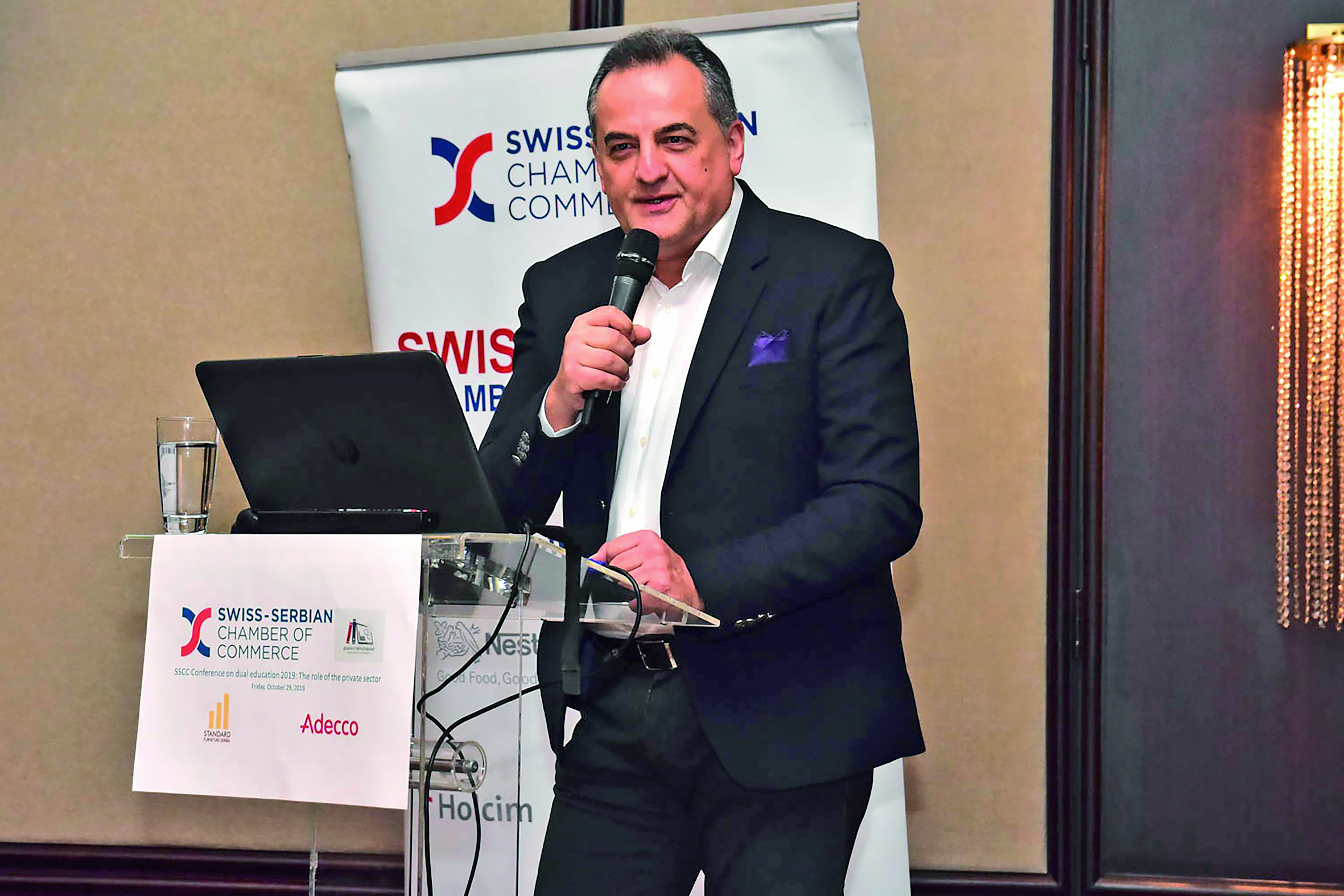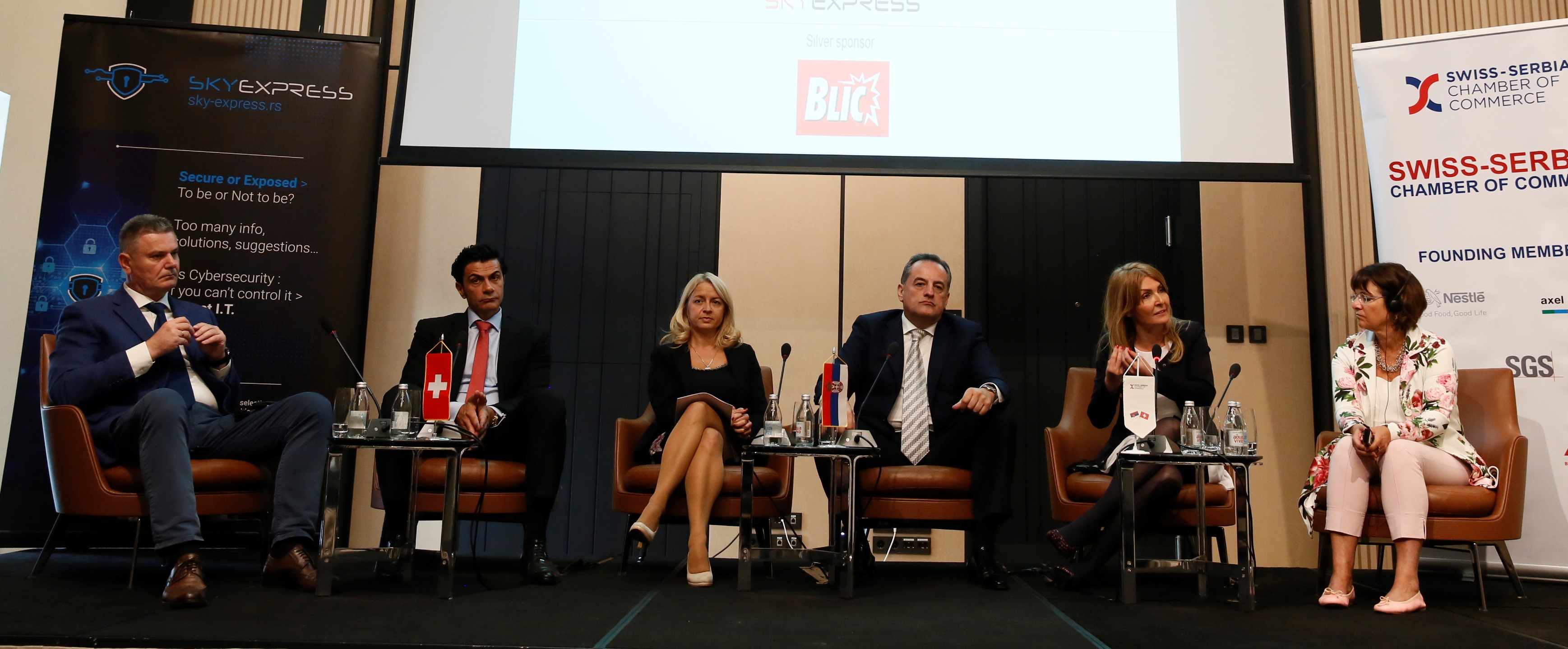Dual education became an integral part of the overall education reforms in Serbia, and Switzerland is recognized as a reliable partner by the Serbian Government in this process

”As you probably know, numerous analyses have shown that the healthiest sectors of the Serbian economy (IT sector, tourism, education, energy agricultural sector) are receiving more and more investments which directly have a positive impact on strategic digitalization of businesses and social eco-systems. The SSCC is taking the role of active factor of both members and management board by increasing exposure, creating networking opportunities, providing better understanding of business community concerns, with more credibility, while providing stronger voice in local decision-making and strengthening the cooperation between the Embassy and its development bodies, and with Swiss development support organisations”, says at the beginning of the interview Majo Mićović, President of the Swiss-Serbian Chamber of Commerce.
Digital economy development involves as of May 2018 a special regulation, GDPR, established by the EU. Howdoes it reflect on Serbian business ecosystem?
– The fact that Serbia is not officially a member of the EU does not mean that it does not need to, under certain conditions, comply with the GDPR. This EU regulation applies to Serbian companies which either (i) offer goods and services online in the Union, or (ii) monitor behaviour of the EU residents, as far as their behaviour takes place within the Union. All Serbian companies should start preparing their compliance with the GDPR, because of the adoption of the new Serbian Data Protection Act and at the same time adoption of a culture of personal data management. This should not be seen only from the perspective of penalties but from the perspective of creating awareness of the possible consequences of misuse of personal information, both at the individual and collective levels. In practice, this means that companies will have to carry out the necessary logistical, organizational and technical measures and activities, which in turn will contribute to the overall improvement of the security of both data and business processes in companies.
Dual education is one of the key factors for Switzerland’s economic success and competitiveness. What can Serbia learn from Swiss practice?
– The Swiss education system enjoys an excellent reputation worldwide and combines high-quality vocational training with university education. This dual system empowers the country’s capacity for innovation and creativity, factors that are crucial to keep and attract skilled workforce, which is one of the challenges Serbia is facing. As a high-income country, Switzerland relies on innovation, entrepreneurship, and collaborative partnerships for growth. This leads to a large number of highly qualified employees with global leadership skills and specialized personnel with a vocational background. In Switzerland, it is easier for companies to find qualified, multilingual, motivated, and loyal employees. So, I believe that Serbia can learn along those lines above a lot from the Swiss educational system, which represents the gold standard in vocational education and training.
How satisfied are you with the implementation of dual education in Serbia so far?
– Dual education became an integral part of the overall education reforms in Serbia, and Switzerland is recognized as a reliable partner by the Serbian Government in this process. Serbia made considerable progress, but it is still in its commencement, and it would be hard to see some significant immediate results in terms of increasing the capacity of skilled workforce. I’m convinced that such results will soon actually be visible, especially because supplying the economy with qualified labour is one of the key challenges in Serbia.
What are the experiences of Swiss companies operating in Serbia regarding the business environment, workforce quality and the new investments outlook?
– As both Serbian and Swiss citizen, I can firmly say that I was aware of the business environment we as investors would establish our companies in. It was only natural to meet both virtues and flaws of the environment, and the plan was to find a balance between those characteristics, which we managed to do by developing Sky Express, one of the leading companies in Serbia and the region in the field of ICT security distribution and consulting. Quality of the workforce, its language skills, technical quality and work ethics, in addition to administrational support from the Government are quite an intriguing and positive aspect of investment activities in Serbia. On the downside, there are some typical post-transitional economy’s aspects: somewhat insufficient perception of the corporate culture, the legal system still doesn’t follow the economic needs of the society, the market is still not protected from the influence of large public companies, etc. All in all, investing in Serbia still gets a lot of positive echoes in global business ecosystems.

How do you rate the total trade cooperation between the two countries? Where do you see the possibilities for further development of this cooperation?
– Switzerland has been a long-term partner with Serbia in transition cooperation and a valuable supporter of the Serbian reform agenda. Good bilateral relations are a result of a large Serbian diaspora (close to 200,000) living in Switzerland and also it’s the presence of 570 Swiss financed companies in Serbia. On the one side, it is obvious that the total bilateral exchange of 450 million euros is far from the capacities and needs of the two countries. Although Switzerland is an important donor in an economic sense, those investments don’t seem to impact on strengthening the exchange of goods between the two countries to a greater extent. On the other side, when it comes to attempts by Serbian companies to find a place for themselves on the Swiss market, we can only say that they are sporadic, and I sincerely admire our people from Serbia who invest their capacities to prove themselves on the Swiss market. Regarding possibilities for further development, I believe that areas with more capacity are primarily ICT security, which is one of the most prominent ICT trends worldwide, then the development of business applications, digital entertainment, such as the gaming industry, and agrotech applications. As an example, company Sky Express d.o.o, which was established by Swiss capital, proves that cooperation with Switzerland is certainly possible: for nine years already, Sky Express and Zurich-based OPEN Systems – an MSSP world leader – have been cooperating in providing the secure internet communications for Serbia’s most important state bodies.
What is the most important thing that Serbia needs to change in order to attract more investors from Switzerland?
– Yet again, I must admit that it is difficult to select one aspect because businesses and investors diverse vastly. The best proof that Serbia is an interesting market for Swiss investors is the fact that there are several hundred companies founded with Swiss capital on the Serbian market. From my viewpoint, Serbia needs to be much more aggressive in presenting its potentials to Switzerland, to use this remarkable advantage in bilateral relations with Serbia, that no other country has to that extent – a remarkably qualified and strong Serbian diaspora community in Switzerland, living only an hour and a half away by air from Serbia. Per year, hundreds of millions of euros are sent to Serbia from people who work in Switzerland to their families and closest ones. This large amount of money still ends up in grey channels of rash spending without any usage as investment, one that would strengthen the economic cooperation of our two countries. That’s what I think should be the most important change, to be implemented as soon as possible. The role of our Chamber in that aspect is analysing possibilities and finding adequate channels to relate those capacities to bring Swiss and Serbian markets closer together.
You have mentioned in your previous interviews a very strong Serbian diaspora in Switzerland. How do you conceive its importance to further the two countries relations development?
– Cooperation between the two countries has a perspective, especially in the field of ICT, not only through outsourcing but also in innovative development of new products and services. The Serbian diaspora in Switzerland has extremely significant potential in both directions. On the one hand, apart from sending money for general consumption, the diaspora can invest money in creating new value by opening businesses in Serbia. On the other hand, with the help of their compatriots in Switzerland, Serbian companies could achieve great export results.